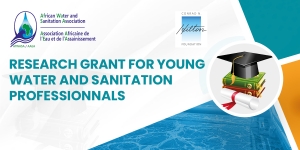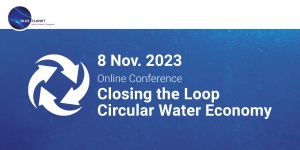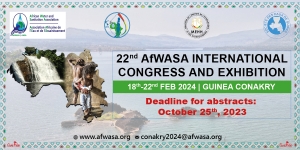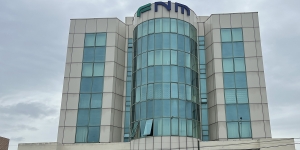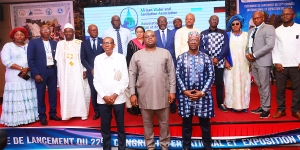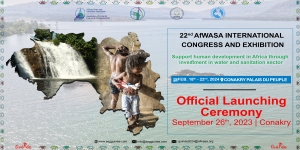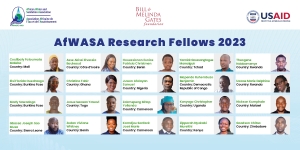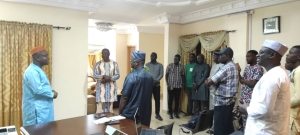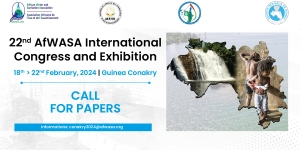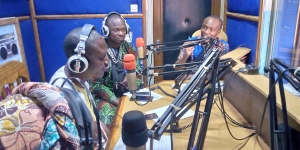Nzickonan Stéphanie
Call for Application: Research Grant for Young Water and Sanitation Professionals
The African Water and Sanitation Association (AfWASA), with the support of the Conrad N. Hilton Foundation (CNHF), are implementing a program entitled "Empowered WASH Systems at District-level in Africa (EMPOWERWASH-Africa).” This program aims at (i)supporting better understanding by AfWASA of WASH systems at district level so to identify the gaps and challenges to improve the performance of service delivery, ii) improving WASH systems at district level throughout knowledge and best practice sharing by the means of peer-to-peer learning approach and iii) supporting the creation of new knowledge and dissemination of best practices through the small grant and Community of Practitioners (CoPs).
It is in that regard the AfWASA is awarding research scholarships to ten (10) African Young Water and Sanitation Professionals. Target beneficiaries are undergraduate, and masters’ students as well as engineers in the final year of their training. Each scholarship, with a maximum value of USD 1,000 (one thousand US dollars), will make it possible to conduct research work sanctioned by a scientific report on a theme related to the WASH in Rural areas.
Application process
Candidates for the scholarship program will formulate their research topics related to the WASH in Rural areas of their respective countries. To apply, applicants must fulfill the following requirements:
- Be a citizen of a sub-Saharan African country.
- Have a strong academic background with respect to their institution.
- Submit an application file including:
- Student card or registration receipt for the current year
- Last completed degree.
- Resume/Curriculum vitae (3 pages max)
- Three recommendation letters (one should be from the academic research supervisor)
- Research proposal form to be downloaded by clicking on the following link Research Proposal Form
Women are encouraged to apply.
Submission
Applicants must submit their application electronically at https://bit.ly/empowerWASHafrica_YWSP_researchgrant_form
The list of successful candidates will be published on AfWASA website: www.afwasa.org and each beneficiary will receive an official notification from AfWASA.
Submission deadline
Students wishing to participate in the program are requested to submit their full application by November 15, 2023. The list of recipients for the 2022-2023 academic year shall be published by January 15, 2024.
Financial aspect
As part of this scholarship, the maximum amount allocated per recipient is US $ 1,000. Sixty percent (60%) of this amount will be paid to the recipient once the detailed plan of the research project is finalized, approved by the research supervisor, and received by AfWASA Research Program Coordinator. The remaining forty percent (40%) shall be paid once the recipient submits the electronic version of their final research report.
Reporting conditions
Students receiving the AfWASA grant will be required to regularly prepare and submit a monthly report on the status of their work and a final report at the end of the research project.
Invitation | Blue Planet Berlin Water Dialogues 2023
BLUE PLANET Berlin Water Dialogues
Online Conference | 8 November 2023 | 12:00 – 17:00 CET
The highly esteemed online conference brings together international experts from research, business, and politics in the field of innovative water management.
Discover how Circular Economy principles can unlock the immense potential of water. Discover water’s value: as a service, a vital ingredient for processes, an energy source, and a transporter of nutrients and other materials.
Get inspired by innovative ideas presented in live keynote speeches, panel discussions and project pitches. Engage in discussions, share your knowledge, and network with entrepreneurs and scientists in one-on-one meetings and breakout sessions.
Participation is free, and the event will be conducted in English. For more information, please visit the website at www.blueplanetberlin.de or follow on LinkedIn and X.
Let’s close the loop together by working towards a Circular Water Economy.
22nd AfWASA Congress Conakry 2024: deadline for abstract submission extended
The African Water and Sanitation Association (AfWASA) is pleased to inform all stakeholders in the water and sanitation sector that the deadline for submission of abstracts for its next congress has been extended to Wednesday, October 25, 2023.
AfWASA invites those who are interested to make all arrangements to submit their abstracts during this period.
The Association urges all stakeholders to take advantage of this opportunity to present their research, projects and ideas to an engaged and diverse audience, while contributing to the sharing of knowledge and improving the quality of life in communities around the world..
For more information, please click on the link: https://abstractconakry2024.afwasa.org/en/call-for-papers
Benin - USAID MuniWASH and FNM Join Forces to Develop Sanitation Sector Financial Products
USAID MuniWASH in collaboration with the National Microfinance Fund (Fonds National de Microfinance, FNM), is strengthening sanitation services in Benin. The partnership aims to create financial products tailored to sanitation companies and households seeking to acquire sanitation products. This approach is serving as a potential model for improved access to finance in the sanitation sector in Benin.
In 2021, the USAID Municipal Water, Sanitation and Hygiene (MuniWASH) Activity conducted a study in Benin to understand the water and sanitation sector. The study revealed significant gaps in the organizational and financial performance, such as low capacity to develop the business and increase market share, poor access to financing of local companies providing sanitation products and services, such as latrine construction, improvement, and emptying. These companies face challenges in accessing traditional financing, including Micro-Finance Institutions (MFIs) that offer unfavorable conditions and are unfamiliar with the sector’s investment potential.
Due to limited funding options, sanitation service providers struggle to acquire necessary equipment, hindering business growth and limiting the availability and quality of sanitation products and services for households. In addition, households themselves face financial constraints in investing in basic sanitation services to improve their living environment. While MFIs offer various financial products, they are not suitable for the sanitation sector due to the low income of the target population and high interest rates on loans. To address these challenges, USAID MuniWASH has focused on enhancing both supply and demand for sanitation products and services by facilitating increased access to finance. The Activity held collaborative meetings with the National Microfinance Fund (Fonds National de Microfinance or FNM) to develop a finance mobilization strategy that promotes accessible and sustainable financial products for the sanitation sector. The Director General of FNM expressed interest in the initiative and committed to mobilizing the necessary financial resources, pending validation by the Board of Directors. The FNM recognizes the potential investment opportunity of this initiative and has agreed to finance the two partner MFIs (PEBCo and AFRICA FINANCES) at a lower interest rate than that offered by local commercial banks. Discussions are underway with these two partner MFIs to explore potential avenues for reducing and aligning credit access conditions for low-income populations, including interest rate, fees, and financial guarantees.
Following this initial exploration phase, the FNM plans to expand the sanitation credit products to other MFIs, with ongoing monitoring and support from USAID MuniWASH. The collaboration aims to identify additional MFIs and financing at the national level, while exploring digitization possibilities to improve access for low-income populations. This partnership between USAID MuniWASH and the National Microfinance Fund has the potential to enhance financing opportunities in the sanitation sector, creating a sustainable and accessible financial ecosystem that contributes to improved sanitation practices and living conditions in Benin.
An Innovative Approach to Bridge the Gap
Following an extensive review process, USAID MuniWASH engaged in discussions with two Beninese MFIs, PeBCo-Bethesda, and AFRICA FINANCES, to gain insights into the existing barriers to financing businesses and households and explore the opportunities in the sanitation sector. As a result, USAID MuniWASH decided to establish partnerships with these MFIs, leveraging their expertise in financing sanitation activities and their dedication to supporting other MFIs.
The collaboration between USAID MuniWASH and the two MFIs will involve the development of two types of credit facilities. The first is a sanitation credit designed to provide households with financing options for investing in sanitation products. The MFIs, with their easy accessibility to the population, will play a crucial role in developing and implementing this credit scheme. The second is a credit facility tailored to the needs of companies that provide sanitation products and services, such as latrine emptying and construction/improvement of latrines, to bolster their market presence. The MFIs will extend their support to these companies based on their specific financing requirements.
The availability of financing through these initiatives will empower sanitation products and service providers to better meet the demand for affordable and high-quality products and services. Simultaneously, households will be able to acquire sanitation products and services that contribute to the improvement of their living environments, particularly in the municipalities where USAID MuniWASH is actively engaged.
By bridging the financing gap in the sanitation sector, this partnership aims to enhance the availability and affordability of sanitation solutions for both businesses and households in Benin. The innovative credit programs developed through this collaboration will pave the way for improved sanitation practices and contribute to the overall well-being of communities in USAID MuniWASH’ s intervention areas.
About the FNM
The National Microfinance Fund, a government institution, contributes to strengthening the financial and technical capacities of actors in the microfinance sector to meet the needs for financial and non-financial services expressed by low-income populations. As part of its mission, the FNM sets up small loans for vulnerable segments of the population through the decentralized financial systems.
About MFIs
PEBCo-BETHESDA is a microfinance institution whose mission is to improve the living conditions of poor populations by offering them quality financial and non-financial services.
AFRICA FINANCES is a microfinance institution whose mission is to contribute to the economic and social development of vulnerable populations, especially women, by offering quality financial and non-financial services at lower cost for better living conditions.
PROJECT DETAILS
The Municipal Water, Sanitation and Hygiene (MuniWASH) is a five-year project funded by the United States Agency for International Development (USAID). Started in September 2019, it is implemented by Tetra Tech with support from Population Services International (PSI) and SEGURA Consulting LLC.
USAID MuniWASH works with municipal governments, national agencies, water and sanitation service providers and civil society organizations to improve and expand water and sanitation services in West Africa. The project focuses on four intermediate results: financial sustainability and investment, operational reliability, governance, and municipal management, and learning and knowledge sharing. In Benin, USAID MuniWASH is implemented in eight municipalities: Abomey-Calavi, Ouidah, Allada, Cotonou, Avrankou, Bohicon, Aplahoué and So-Ava.
The USAID MuniWASH Activity is implemented by Tetra Tech in Benin and Côte d'Ivoire in collaboration with its learning partner, the African Water and Sanitation Association (AfWASA).
Initial target countries: Côte d'Ivoire and Benin. Contacts: Jules, Hountondji, Contracting Office Representative, This email address is being protected from spambots. You need JavaScript enabled to view it. or Safaa Fakorede, Chief of Party, This email address is being protected from spambots. You need JavaScript enabled to view it.
Keywords: USAID, sanitation, credit, Benin, FNM, household, MSME, MFI
Author: Tossounon Alain, François AZIMBLIGBO
Copyright: USAID MuniWASH.
22nd AfWASA International Congress: Prime Minister of Guinea chairs launch ceremony in Conakry
The 22nd AfWASA International Congress and Exhibition will be held from 18 to 22 February 2024, in Guinea Conakry. A few months before the event, the Pan-African Association organized, this Tuesday, September 26, in Conakry, the capital that will host the event, the official launching ceremony, in the presence of the Prime Minister of Guinea, Dr. Bernard Goumou.
"Supporting human development in Africa through investments in the water and sanitation sector" is the theme of this congress which will bring together about 2000 people in the Guinean capital.
For Camara Aboubacar, Director General of the Guinea Water Company, this theme is a call to action. "It reminds us that we have a collective responsibility to make a difference, create opportunities, and open doors for future generations." For him, AfWASA Congress is "an opportunity to come together with a common goal: to share our knowledge, experiences and ideas, in the hope of finding innovative and sustainable solutions that will have a positive impact on our communities".
In his speech, Mr. Sylvain Usher, Executive Director of AfWASA explained that this launching ceremony aims to inform national and international opinion, to reassure all stakeholders in the water and sanitation sector, that the 22nd Congress of tAfWASA will indeed take place in Guinea Conakry. Afterwards, referring to the challenges of access to water and sanitation services on the continent, he said: "It is our duty, as an Association and son of Africa, (...) to ensure that each of our fellow citizens has access to clean and safe water, as well as adequate sanitation facilities." Therefore, this congress will not only be a forum for discussion, it will be a platform for solutions and actions.
Mr. Aly Seydouba Soumah, Guinean Minister of Energy, Hydraulics and Hydrocarbons, for his part, said that the transitional authorities in Guinea have made access to drinking water and sanitation a national priority. This is why he continued, "we dare to believe that the organization in Guinea of this 22nd Congress of AfWASA will further expand the framework conducive to the mobilization of technical and financial resources and expertise necessary to strengthen water and sanitation infrastructure, for the happiness of our populations."
Concluding the series of speeches, the Prime Minister of Guinea, Dr. Bernard Goumou pleaded for the challenges of access to drinking water and sanitation to be a priority within the policies of African governments, so that sustainable solutions are found for the populations. Speaking about his country Guinea, he acknowledged that despite being described as the water tower of West Africa, due to its enormous water potential, the country struggles to take advantage of its resources. This is why he hoped that this 22nd Congress would be historic for his country, Africa and the world, by its political impact on water and sanitation management." The stability of our societies in Africa, the health security of our populations, and the preservation of the environment that we must leave as a legacy to our children."
It should be noted that the launching ceremony of the 22nd International Congress ended with the official inauguration of the Congress logo.
Official Launch of the 22nd AfWASA Congress: the Local Organizing Committee is Preparing a Memorable Event
The 22nd AfWASA International Congress and Exhibition will take place from February 18 to 22, 2024 in Guinea Conakry, under the theme of support human development through investment in the water and sanitation sector.
For the occasion, AfWASA appointed Société des Eaux de Guinée (SEG) as Co-organizer of this event.
A few months before this important event, and as usual within AfWASA, a launch ceremony is scheduled on Tuesday, September 26th, 2023 in Conakry. It will be attended by the country's leading authorities, local development partners and a delegation from the AfWASA.
The local congress organizing committee, chaired by the Managing Director of SEG, Mr. Camara Aboubacar, is getting geared up to make the Congress quite memorable and impressive.
AfWASA Awards Research Grants to African Master and Doctoral's Students
As part of its capacity-building program for African stakeholders in the water, sanitation and hygiene sector, the African Water and Sanitation Association, with funding from USAID and Bill and Melinda Gates Foundation, awards research grants to African Master and doctoral's Students Young Professionals in Water and Sanitation.
Each small grant, worth a maximum of 1,000 USD, will enable students to conduct research on topic or issues related to the water, hygiene and sanitation sector.
For the 2022-2023 academic year, following the call for applications and the selection process, 20 students from 16 African countries have just been selected to benefit from this scholarship.
USAID MUNIWASH launches citizen evaluation and social audit, enhancing transparency of wash services in Bohicon, Benin
On May 10, 2023, the Mayor of Bohicon officially launched an important initiative to promote transparency and fairness in water, hygiene, and sanitation (WASH) services. Supported by the United States Agency for International Development (USAID) through its Municipal Water, Sanitation, and Hygiene (MuniWASH) project, this evaluation aims to improve the quality of WASH services in the commune of Bohicon. Working in collaboration with the Cadre de Concertation des Acteurs Non Etatiques des Secteurs de L'eau et de L'assainissement (CANEA) - a group of non-state actors in the water and sanitation sectors this initiative seeks to enhance accountability and ensure better service delivery for the community.
The launch event emphasized the critical role of stakeholders, including local civil society organizations (CSOs), water and sanitation service providers, and technical directors from the municipal administration, in promoting accountability and transparency. The event introduced the concept of citizen evaluation and social audit, highlighting the need to evaluate performance, increase transparency in resource management, and hold providers responsible for the quality of their services.
To facilitate the process, the MuniWASH project and the municipality have established a dedicated three-person study team consisting of individuals from CSOs and the municipal administration. This team will conduct a comprehensive assessment of the WASH sector in the commune, engage relevant actors, and facilitate the evaluation and audit. The social audit initiative has fostered open and transparent discussions among participants eager to contribute their perspectives.
Mayor Rufino d'Almeida expressed his strong commitment to the initiative, stating, "The municipal council and myself welcome the analysis of CSOs regarding water and sanitation services in our commune."
Representing civil society, Michel KLOTOE from the Cellule de Participation Citoyenne expressed gratitude for USAID’s support, stating, "We thank USAID for its support to this initiative, which I am convinced will improve the quality of water, sanitation, and hygiene services in the commune of Bohicon."Rachel ARAYE, representing CANEA, commended the Mayor's commitment and the presence of high-level officials from the municipal administration, highlighting their interest in the social audit activity of WASH services.
MuniWASH aims to strengthen collaboration between municipal authorities and CSOs to assess and improve water and sanitation services. By employing citizen evaluations and social audits, the project aims to ensure fair, transparent, and responsive service provision, with a particular focus on vulnerable and underserved populations. Moving forward, the evaluation and social audit process will involve meetings with service providers, citizen evaluations that engage the community, physical audits of infrastructure, and direct interactions between service beneficiaries and providers.
With the support of civil society organizations, social audits of WASH services can be powerful tools for empowering communities to assess the performance of local governments and promote transparency in the management of public resources. These collaborative techniques enable the evaluation of specific aspects of service provision, ultimately driving positive change in the water, hygiene, and sanitation sector.
About MuniWASH
MuniWASH works with municipal governments, national agencies, water and sanitation service providers and civil society organizations to improve and expand water and sanitation services in West Africa. The project focuses on four service areas: financial sustainability and investment, operational reliability, governance and municipal management, and learning and knowledge sharing. In Benin, MuniWASH is implemented in eight municipalities: Abomey-Calavi, Ouidah, Allada, Cotonou, Avrankou, Bohicon, Aplahoué and So-Ava. The MuniWASH Activity is implemented by Tetra Tech in Benin and Côte d'Ivoire in collaboration with its learning partner, the African Water and Sanitation Association (AfWASA).
Initial target countries: Côte d'Ivoire and Benin.
Contacts: Jules, Hountondji, Contracting Office Representative, This email address is being protected from spambots. You need JavaScript enabled to view it. or Safaa Fakorede, Chief of Party, This email address is being protected from spambots. You need JavaScript enabled to view it.
Keywords: USAID, MuniWASH, Social Audit, Water, Hygiene, Sanitation, Bohicon, Benin
Author: Marcel ADJAMAIDOTOME
Copyright: USAID MuniWASH, May 2023.
Note: This news article is a summary of the launch event for the citizen evaluation and social audit of WASH services in Bohicon. It highlights the objectives, stakeholders involved, and the significance of this initiative in promoting transparency and equity in service delivery.
The call for papers is now open!
We invite the entire scientific community, professionals in the water and sanitation sector and all actors engaged in the fight for access forall to water and sanitation to submit a paper to be presented at the 22nd Congress of the African Water and Sanitation Association to be held in Conakry from February 18-22, 2024. The relevant and interesting papers should address issues related to the general theme and sub-themes of the congress.
At the same time, we invite our industry partners to propose thematic sessions that fit into one or the other of the sub-themes we propose below.
Click here to download the call for papers.
For more information and/or to submit your abstract, please click here.
Benin | The Municipality of Allada Promotes Improved Sanitation with the Support of USAID MuniWASH
The Municipality of Allada in Benin is taking proactive steps to raise awareness and promote improved sanitation practices within the local community. With the support of the USAID MuniWASH activity, the town council organized three radio programs on March 16, 18, and 22, 2023, to disseminate information about the new national public hygiene law and promote sanitation products offered by local service providers. This initiative aims to position municipalities as promoters of sanitation and strengthen enforcement of regulations in the WASH sector.
The new national public hygiene law, No. 2022-04, was adopted on January 20, 2022, and came into effect on February 16, 2022, superseding the previous Public Hygiene Code (No. 87-015 from September 1987). The law places emphasis on the role of decentralized local authorities, including municipalities, in promoting hygiene. Local authorities are required not only to promote sanitation but also to enforce this law. It covers general provisions, public hygiene regulations, pollution, and nuisance issues, as well as penal actions. Consequently, it serves as an advocacy tool for MuniWASH and other stakeholders to encourage municipalities to allocate more funding to the sanitation sector and support private providers in delivering sanitation services.
Under the leadership of Allada’s press and communications manager (Mr Stanislas MONBABA), the municipality collaborated with USAID MuniWASH and various stakeholders, including the sanitary police, local sanitation entrepreneurs, the Atlantic Departmental Directorate of Health, partner radio station “LA VOIX DE LA LAMA,” and the residents of Allada, to produce three radio programs.
The first radio program, conducted in the local Fongbé language on Thursday, March 16, 2023, provided listeners with a comprehensive understanding of the new public hygiene law in Benin, including information on penalties for non-compliance.
The second broadcast also in the Fongbé, aired on March 18 and focused on sanitation products. It took place at the studio of “LA VOIX DE LA LAMA” and featured a live interactive format encouraging listeners to call in for additional information about sanitation products and supplier contacts. The radio station provides coverage for all 8 communes within the Atlantic district, including Allada, Abomey-Calavi, Kpomassè, Ouidah, Sô-Ava, Toffo, Tori-Bossito, and Zè. Additionally, its reach extends beyond these areas, as some listeners from Bohicon have also tuned in. Furthermore, the radio station has an online presence through its website. Its potential audience is estimated to be around 4 million people, with women comprising 48% of the total audience.
The final program, entitled “Atchakpodji,” was a crowd radio show held in central Allada on Wednesday, March 22, to coincide with World Water Day. Approximately 50 participants attended the event, which aimed to enhance community understanding of the new public hygiene law and highlight the solutions proposed by sanitation service providers. The event concluded with the sanitary police distributing water quality test kits and a public tour of the sanitation facilities by the local sanitation entrepreneurs. Participants expressed great satisfaction with the program and pledged to improve their hygiene and sanitation practices.
To further promote sanitation and contribute to improved access to sanitation for the people of Allada, the town council plans to produce and regularly broadcast throughout 2023 five microprograms covering sanitation products and the provisions of the new hygiene law. These proactive measures taken by the municipality of Allada signify its commitment to raising awareness and fostering positive change in the sanitation sector. With the collaborative efforts of various stakeholders and the engagement of the local community, a brighter future for sanitation practices in the community is anticipated.
About USAID MuniWASH:
MuniWASH works with municipal governments, national agencies, water and sanitation service providers and civil society organizations to improve and expand access to water and sanitation services in West Africa. The project focuses on four service areas: financial sustainability and investment, operational reliability, municipal management, and learning and knowledge sharing. In Benin, MuniWASH is implemented in eight municipalities: Abomey-Calavi, Ouidah, Allada, Cotonou, Avrankou, Bohicon, Aplahoué and So-Ava. The MuniWASH Activity is implemented by Tetra Tech in Benin and Côte d'Ivoire in collaboration with its learning partner, the African Water and Sanitation Association (AfWASA).

 English
English  Français
Français 
